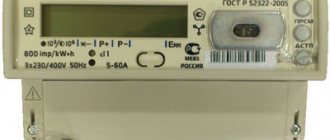In this article we will talk about ways to save energy:
- Ways to save energy in an enterprise
- How to save energy in offices
- Ways to save electricity in school and kindergarten
- How to save energy in a private home
- Ways to save energy at home
To save energy, you just need to take simple and affordable measures, as well as follow some rules.
As proof of this, we will present 89 of the most effective ways to save energy that can be applied in various fields of activity.
Methods for saving energy in an apartment
Legal ways to save energy in an apartment are discussed in more detail below:
- replacing old light bulbs with new generation LED lighting, since such designs consume less energy;
- it is necessary to exclude the constant operation of the TV and other equipment when no one uses them, since electricity is consumed but does not provide any benefit;
- replacing large chandeliers with small lamps and spotlights;
- turn off the lights in a timely manner before leaving home;
- the use of carriers and extension cords increases energy consumption, so they should be used only in cases of urgent need;
- household appliances consume a small amount of electricity in standby mode, so this fact is also important to consider when trying to find a good way to save money;
- loading the washing machine in accordance with the recommendations given in the instructions, since overloading it causes high energy consumption;
- purchasing special heat-displaying screens for equipment that save energy consumption and maintain optimal room temperature, which is important in the winter;
- insulation of windows, loggias, balconies in the apartment;
- insulation of floors (if the apartment has the opportunity to implement this idea);
- correct location and use of electrical appliances in the kitchen (the refrigerator cannot be placed next to the electric stove, it is best to use a microwave oven as heating, and instead of an electric kettle, use a thermopot with thermos functions).
One of the effective ways to save money is multi-tariff meters, which count electricity at a reduced tariff (for example, washing or washing dishes in machines can be postponed until the evening and thus reduce energy consumption).
Another way to save money is installing a dimmer (power regulator in LED lamps) or installing motion sensors that automatically turn off the lights when there is no one in the room.
A modern method is to use smart sockets (“smart”), which are inserted into a regular connector and consume significantly less energy. The innovative “smart home” development allows you to control all electrical appliances remotely. This service is not cheap, but quickly pays for itself.
Illegal ways that save electricity:
- installation of magnets on the electric meter (rewinding the readings in the opposite direction when excluding the device from the general power supply network);
- installation of new electrical wiring, as power losses were noticed with aluminum wiring;
- operation of devices bypassing the meter, which does not contribute to the display of real device readings.
The above methods are illegal, therefore their use is punishable by administrative liability (carrying out inspections by specialists, drawing up an act, protocol and imposing fines).
Therefore, such methods will not help save money, but on the contrary will increase the expenses of the family budget several times. It is best to use legal methods and not fall into the category of scammers deceiving the state.
Energy saving light bulbs
In recent years, traditional incandescent lamps are increasingly being replaced by more modern energy-saving ones. This is due to the fact that they consume a large amount of energy, which is only slightly converted into light. According to scientists, only 5% of the electricity consumed by an incandescent lamp turns into light - the rest simply goes to electricity bills.
This is why energy efficient light bulbs seem to be so much more efficient. They require much less energy, so they will work especially in areas where light is used the most (including the living room or workshop). Although, they should not be installed everywhere, for example in the bathroom, where they will only run for a moment. Why? Energy-saving lamps require a lot of power to operate - these losses are compensated only in case of longer operation. All this means that in rooms such as the bathroom, an energy-saving lamp will not be an effective solution.
How to save electricity in a private house with an electronic meter
Recommendations to help save energy in a private home:
- use of special induction, electrode boilers;
- the use of timers, thermostats that control the operating mode of electrical appliances;
- introduction of technologies that allow remote control over electricity consumption;
- regular cleaning of the electric kettle and water heater from accumulated scale;
- use of a sink with an installed valve for economical consumption of hot water;
- using a wood-burning stove instead of an electric stove (this method is relevant in houses located near forest plantations);
- operation of a solid fuel heater with a cooking surface in order to save energy;
- use of all household appliances with energy saving class A;
- the use of induction cookers with the function of heating food (the efficiency of such devices is about 90%);
- use of low power lamps;
- introduction of photovoltaic lamps in the yard;
- installation of sockets with timers that program the operating time of an electrical appliance.
How to save energy in an enterprise
Basic recommendations on how to use less electricity are presented in the list below:
- implementation of equipment modernization;
- use of adjustable drives that have variable load:
- the use of soft start systems, as they save electricity and protect devices from breakdown;
- operation of modern power generating equipment (steam-gas, steam turbine units);
- replacement of electric boiler houses with equipment running on local energy sources (peat, pellets);
- the use of high-tech equipment that can operate on secondary energy resources or industrial waste products;
- operation of equipment with non-traditional energy sources (biogas plant, solar collector, wind power plant, hydroelectric power station);
- full inspection of industrial lighting systems, electrical appliances and elimination of unnecessary electricity losses;
- correct location of windows that let in the maximum amount of light and create natural light in the room (energy savings of up to 15%);
- availability of an appropriate position for a person responsible for the economical consumption of electricity in production;
- proper handling of production employees and economical use of energy;
- installation of electricity metering devices with high-precision characteristics.
How to save electricity at school and kindergarten
Energy savings in schools and kindergartens are achieved by following the following recommendations:
- the use of long-lasting and energy-efficient lighting lamps (their cost quickly pays off);
- drawing up an optimal training schedule with minimal use of artificial lighting;
- painting rooms and classrooms in light colors, as they increase the degree of natural light;
- correct installation of refrigerators (presence of a gap between the heat exchanger and the wall for normal air circulation and avoidance of too frequent switching on);
- regularly turning off equipment that is not in use (computers, audio equipment, printers, other devices);
- setting up computer software for the correct operation of all devices;
- conducting training events on the basics of economical energy consumption;
- operation of modern audio, video equipment, household appliances;
- installation of electricity consumption monitoring systems.
Useful tips
Saving energy in your own home is primarily associated with the development of certain habits, thanks to which situations with excessive energy consumption will not arise. What are we talking about?
- Make the most of daylight. Turning on room lights too early is a common problem in many homes. In this case, even if comfort increases, it is only slightly, but electricity consumption increases significantly. To avoid this, it is worth moving a chair, sofa or table closer to the window, thanks to which we can use daylight for much longer;
- Do not put warm dishes in the refrigerator - it will take a lot of energy to cool them;
- Only run the dishwasher when it is completely filled with dirty dishes;
- Try not to leave equipment and lights when you are not using them;
- Use the "Energy Saving" mode in electronic devices;
- Check the tightness of the walls and roof of the house;
- Do not leave the refrigerator open;
- When you brush your teeth and shave, don't leave the water running;
- Take advantage of cheaper tariffs and modern electricity meters.
Did you find this article helpful? Please share it on social networks: Don't forget to bookmark the Nedvio website. We talk about construction, renovation, and country real estate in an interesting, useful and understandable way.
How to save energy when operating a boiler, computer and air conditioner
When operating appliances such as a boiler, computer, or air conditioner, you can also follow recommendations for saving energy:
- installing a shower instead of a bath when using an electric boiler to heat water;
- purchasing a device with a timer that controls the water heating process;
- use of devices with energy-saving mode (computer, air conditioner, boiler in energy-saving mode);
- operation of computers that do not have high power (video card, powerful processor, video editing). Energy-saving appliances consume less electricity;
- The air conditioner should only be operated indoors;
- Modern models of air conditioners are presented with the characteristics of energy saving and self-shutdown when they are set on a timer, so it is best to install them in order to save energy.
By the way, there is an excellent selection of climate control equipment in this store millimetr.ru. There you will find a huge assortment of products from leading manufacturers in the field of climate control equipment!
Theoretical part
Electricity is not only a very important helper in everyday life, but also the most necessary element for survival. It is impossible to imagine our life without electricity. The largest share of energy expenditure occurs in the household. In our homes, electric current lights the lights, heats the iron, makes the computer, refrigerator and other appliances work. Every year the number of electrical appliances increases, more and more illuminated billboards and other structures that require large amounts of electricity. This invisible worker is used everywhere.
The increase in electricity consumption increases the burden on nature, natural resources are depleted, and the threat of “energy hunger” is added to environmental problems.
The irrational use of electricity consumes coal, gas, oil and water, the reserves of which are not unlimited, and the emissions of harmful substances into the atmosphere are enormous: residents of large cities are suffocated by smog. As a result of burning fuel and reducing forests on earth, the concentration in the atmosphere increases, so the natural balance in the atmosphere is disrupted, which leads to warming and overall climate change. The relative availability of electricity, heat, and hot water creates the idea among many people that these benefits appear spontaneously and they will never exhaust themselves. “Why save them if everyone is provided with them in sufficient quantities at an affordable price? I’ll pay for as much as I spend, I’ll spend more, so what, I’ll pay more.” We believe that this is wrong, because the main resources used in energy generation are non-renewable. Failure to use energy wisely will quickly lead to it becoming less accessible and more expensive.
Today in the modern world, energy saving is an integral part of the life of a civilized society. This includes taking care of your health, saving money, and living comfort. But one of the most important (global) characteristics of energy saving is protecting the environment from negative impacts. Energy saving is technology and lifestyle that helps us reduce energy consumption through its rational use. In a narrower sense, energy saving implies maintaining an environmentally friendly lifestyle through the use of new technologies that help save our money and the natural resources of our planet, which have recently been so thoughtlessly consumed by humanity, which can ultimately lead to catastrophic climate change . When we reduce the amount of energy we use, we automatically try to reduce the rise in temperature of our atmosphere (this process is known as global warming).
Description of “magic boxes” that save electricity
Smart meters, which were established by law, are popularly called “magic boxes” due to the ability to independently transmit data to inspection services and automatically turn off electricity in the event of system non-payment.
There are no readings on the device, but the “magic box”, when connected to the network, displays 6–7 modes with visualization of numbers. However, many consumers doubt the exact operating algorithm of such devices.
The cost of installing such a meter averages 6,000–15,000 thousand rubles. The operating algorithm of the device requires careful study, since most consumers have not mastered the principle of its operation and obtaining data without taking readings on the account.
8(499)490-60-60
- Use of energy efficiency class A household appliances.
- Application of energy efficient windows. For example, triple-glazed windows will protect the room from overheating in the summer and reduce the load on the air conditioner.
- Use of high-quality wiring. Old or incorrect wiring increases not only the fire hazard, but also the amount of wasted electricity.
- The use of network filters that allow one switch to disconnect all equipment connected to them from the network. Please note that even a speaker system connected to the network consumes, on average, about 11 W/hour.










